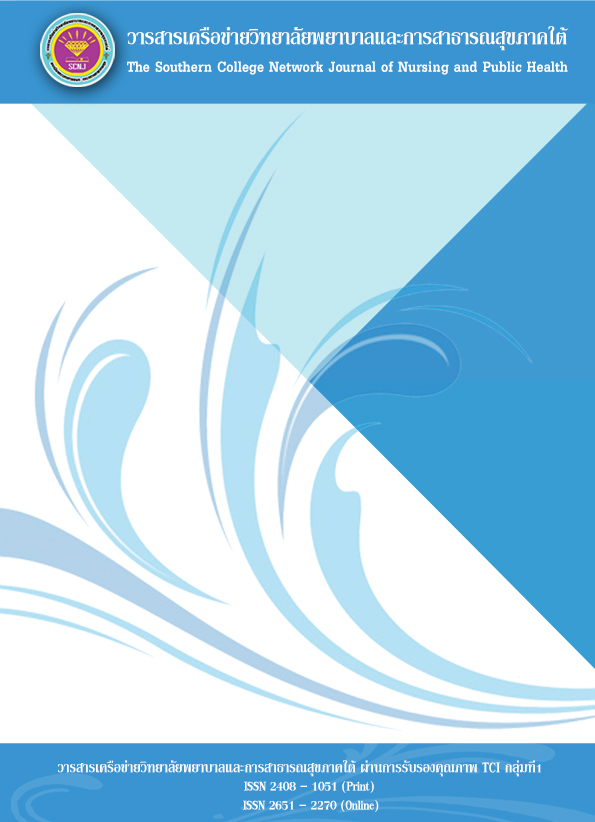ผลกระทบจากการตีตราและแนวทางการกำกับการกินยาแบบมีพี่เลี้ยง สำหรับผู้ป่วยวัณโรคในสังคมไทย
คำสำคัญ:
การตีตรา, การกำกับการกินยาแบบมีพี่เลี้ยง, วัณโรค, วินัยในการกินยาบทคัดย่อ
บทความนี้มีวัตถุประสงค์เพื่อเสนอข้อมูลเกี่ยวกับผลกระทบจากการตีตรา และเสนอแนะแนวทางการกำกับการกินยาแบบมีพี่เลี้ยงสำหรับผู้ป่วยวัณโรคในสังคมไทย เนื่องจากวัณโรคเป็นโรคติดต่อที่ยังเป็นปัญหาสาธารณสุขในหลาย ๆ ประเทศทั่วโลกรวมทั้งประเทศไทยด้วย วิธีการกำกับการกินยาวัณโรคแบบมีพี่เลี้ยงเป็นวิธีการหนึ่งที่มีหลักฐานยืนยันว่า ช่วยส่งเสริมให้ผู้ป่วยวัณโรคมีวินัยในการกินยาอย่างต่อเนื่องและครบถ้วนตามระยะเวลาที่กำหนด อย่างไรก็ตามผลกระทบจากการถูกตีตราจากครอบครัว ชุมชนและสังคม ยังเป็นอุปสรรค สำคัญในการเปิดเผยข้อมูลความเจ็บป่วยด้วยวัณโรคและการเข้ารับการกำกับการกินยาแบบมีพี่เลี้ยง ดังนั้นผู้ที่ทำหน้าที่เป็นพี่เลี้ยงซึ่งถือเป็นผู้ที่คอยอำนวยความสะดวกในการกินยาของผู้ป่วยจะต้องเป็นคนที่มีบุคลิกน่าเชื่อถือ มีทักษะในการสร้างสัมพันธภาพและการสื่อสารระหว่างบุคคล ดูแลผู้ป่วยด้วยความเข้าใจ เห็นอกเห็นใจ และต้องมีความเชื่อถือไว้วางใจผู้ป่วย อันจะช่วยส่งเสริมให้ผู้ป่วยมีวินัยในการกินยาจนครบตามแผนการรักษา หายจากโรคและลดการแพร่กระจายเชื้อไปสู่บุคคลอื่นต่อไป
เอกสารอ้างอิง
Control Programme Guideline, Thailand, 2018. Bangkok: Aksorn Graphic and Design Publication Limited Partnership.
Chaichan, M., & Kampraw, P. (2014). Stigma of HIV: Social Illness. Journal of The Royal Thai Army Nurses, 15(3), 170-173.
Choowong, J., Tillgren, P., & Söderbäck, M. (2016). Thai District Leaders’ Perceptions of Managing the Direct Observation Treatment Program in Trang Province, Thailand. BioMed Central Public Health, 16(653), DOI 10.1186/s12889-016-3341-1.
Choowong, J., Tillgren, P., & Söderbäck, M. (2017). Thai People Living with Tuberculosis and How They Adhere to Treatment: A Grounded Theory Study. Nursing & Health Sciences, 1-8, DOI: 10.1111/nhs.12362.
Choowong, J., Tillgren, P., & Söderbäck, M. (2018) Directly Observed Therapy Providers’ Practices When Promoting Tuberculosis Treatment in a Local Thai Community. Journal of Public Health in Developing Countries, 4(1), 458-466.
Chinnawong, T. (2007). The Influences of Thai Buddhist Culture on Cultivating Compassionate Relationships with Equanimity Between Nurses, Participants and Relatives: a Grounded Theory Approach. Unpublished Doctoral Dissertation. Southern Cross University: Lismore.
Commisceo-Global. (2016). Thai Guide: A Look at Thai Language, Culture, Customs and
Etiquette. Retrieved from: http://www.commisceo- global.com/country-guides/thailand-guide.
Courtwright, A., & Turner, A. N. (2010). Tuberculosis and Stigmatization: Pathways and
Interventions. Public Health Reports, 125(4), 34-42.
Goffman, E. (1963). Stigma: Note on the Management of Spoiled Identity. New Jersey:
Prentice-Hall.
Jin, J., Sklar, G. E., Sen, Oh. V. M., & Li, S. C. (2008). Factors Affecting Therapeutic Compliance: A Review from the Participant's Perspective. Therapeutics and Clinical Risk Management, 4(1), 269- 286.
Komin, S. (1991). Psychology of the Thai People: Values and Behavioral Patterns. National Institute of Development Administration (NIDA), Bangkok. (in Thai).
Lertmaharit, S., Kamol-Ratankul, P., Sawert, H., Jittimanee, S., & Wangmanee, S. (2005). Factors Associated with Compliance among Tuberculosis Participants in Thailand. Journal of the Medical Association of Thailand, 88(4), S149-S156.
Macq, J., Torfoss, T., & Getahun, H. (2007). Participant Empowerment in Tuberculosis Control: Reflecting on Past Documented Experiences. Tropical Medicine & International Health, 12(7), 873–885.
Munro, S. A., Lewin, S. A., Smith, H. J., Engel, M. E., Fretheim, A., & Volmink J. (2007). Patient Adherence to Tuberculosis Treatment: A Systematic Review of Qualitative Research. PLoS Medicine, 4(7), 1230-1245.
Ngamvithayapong-Yanai, J., Winkvist, A., Luangjina, S., & Diwan, V. (2005). If We Have to Die, We Just Die: Challenges and Opportunities for Tuberculosis and HIV/AIDS Prevention and Care in Northern Thailand. Qualitative Health Research, 15(9), 1164-1179. DOI: 10.1177/1049732305281616
Open Society Institute Public Health Program. (2006). Civil Society Perspectives on TB Policy in Bangladesh, Brazil, Nigeria, Tanzania and Thailand. New York: Open Society Institute.
Pandit, N., & Choudhary, S. K. (2006). A Study of Treatment Compliance in Directly Observed Therapy for Tuberculosis. Indian Journal of Community Medicine, 31(4), 241-243.
Phata, R., & Suggravetsiri, P. (2015). Factors Related with Quality of Life among Tuberculosis Patients, Buadang-Pakdee-Somboon Health Network, Chaiyaphum Province. KKU Journal for Public Health research, 8(1), 6-12.
Pungrassami, P., Johnsen, P., Chonguvivatwong, V., & Olsen, J. (2002). Has Directly Observed Treatment Improved Outcome for Participants with Tuberculosis in Southern Thailand? Tropical Medicine & International Health, 7(3), 271-279.
Pungrassami, P., Kipp, A. M., Stewart, P. W., Chongsuvivatwong, V., Strauss, R. P., Van, & Rie, A. (2010). Tuberculosis and AIDS Stigma among Patients who Delay Seeking Care for Tuberculosis Symptoms. International Journal of Tuberculosis and Lung Disease, 14, 181-187.
Sengupta, S., Pungrassami, P., & Balthip, Q. (2006). Social Impact of Tuberculosis in Southern Thailand: Views from Participants, Care Providers and the Community. International Journal of Tuberculosis and Lung Disease, 10(9), 1008–1012.
Suwankeeree, W., & Picheansathian, W. (2014). Strategies to Promote Adherence to Treatment by Pulmonary Tuberculosis Patients: a Systematic Review. International Journal of Evidence-Based Healthcare, 12(1), 3-16. DOI: 10.1097/01.XEB.0000444614.17658.46
World Health Organization. (2006). The Global Plan to Stop TB, 2006-2015. Actions for Life: Towards a World Free of Tuberculosis. WHO/HTM/STB/2006.35. Geneva: World Health Organization.
World Health Organization. (2011). WHO Country Cooperation Strategy Thailand 2012–2016. New Delhi: World Health Organization, Regional Office for South-East Asia.
World Health Organization. (2018). Global Tuberculosis Report 2018. France: World Health Organization, WHO/CDS/TB/
ดาวน์โหลด
เผยแพร่แล้ว
ฉบับ
ประเภทบทความ
สัญญาอนุญาต
1. บทความหรือข้อคิดเห็นใด ๆ ที่ปรากฏในวารสารเครือข่าย วิทยาลัยพยาบาลและการสาธารณสุขภาคใต้ ที่เป็นวรรณกรรมของผู้เขียน บรรณาธิการหรือเครือข่ายวิทยาลัยพยาบาลและวิทยาลัยการสาธารณสุขภาคใต้ ไม่จำเป็นต้องเห็นด้วย
2. บทความที่ได้รับการตีพิมพ์ถือเป็นลิขสิทธิ์ของ วารสารเครือข่ายวิทยาลัยพยาบาลและการสาธารณสุขภาคใต้








